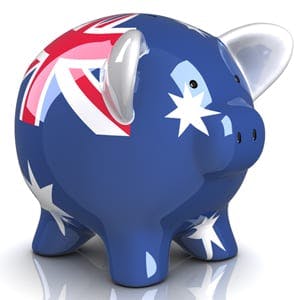The National Australia Bank (NAB) and the Commonwealth Bank (CBA) are the first of the Big Four banks to reduce their standard variable interest rates following Tuesday’s surprisingly large rate cut by the Reserve Bank (RBA), with both failing to pass on the full amount.
The NAB was the first to reduce its standard variable rate, cutting it by 32 basis points to 6.99 percent yesterday afternoon. The CBA reduced its rate by 40 basis points this morning to 7.01 percent.
Prior to NAB’s announcement, the Bank of Queensland revealed it would cut its variable home loan rate by 35 basis points to 7.11 percent.
According to NAB, the cut means its customers will save an extra $80 per month in interest on the average $300,000 home loan.
In a bid to reignite consumer confidence, NAB’s personal banking group executive Lisa Gray says, NAB has set the bar, providing the lowest standard variable home loan rate of the major banks for 34 months and will endeavour to remain the lowest throughout 2012.
“The European debt crisis is having an impact on the global and domestic economy. By maintaining the lowest standard variable rate of the major banks, we have sought to continue to shield our customers from current global economic instability,” said Gray.
Damian Smith, chief executive of financial comparison website RateCity, said consumers and business shouldn’t expect any of the lenders to pass the full cut.
“The signals from the big four banks suggest that they will try to hold on to part of this rate cut: remember that of the 50 basis point cash rate reduction from the RBA since November, the big four banks have only passed on around 40 basis points to variable rate home loan customers,” he said.
The Australian National Retail Association (ANRA) has praised the move and remains hopeful other lenders will follow the RBA’s direction.
Margy Osmond, CEO of ANRA said: “The Reserve Bank of Australia has moved the cash rate in the right direction and the significant cut of 50 basis points will be welcomed by the retail sector, if the banks follow suit.”
According to Osmond, economic predictions and soft retail trading figures represented more work needs to be done to grow Australia’s retail community and RBA’s recent decision to slice the cash rate will help the sector move forward.
“Retailers will be cautiously optimistic that the cut will encourage shoppers to swap saving for spending” and “will now look to the banks to pass this cut on to consumers so they can prepare for the winter sales period with some hope of a consumer in the mood to spend,” Osmond said.
Peter Anderson, the chief executive of Australian Chamber of Commerce and Industry agrees with Osmond, suggesting the small business sector is in dire need of some good news.
“The rate reduction doesn’t reflect an economy in crisis but an economy where the slow lanes of growth still need support, where the cost of finance has been relatively high and where business and consumer confidence need to be strengthened,” said Anderson.
Anderson stressed the importance that RBA stands firm in its decision to reduce rates, as the bank predicts next week’s federal budget may slow the economy.
ANZ and Westpac are yet to confirm whether they’ll pass on any or all of the RBA’s rate cut.

